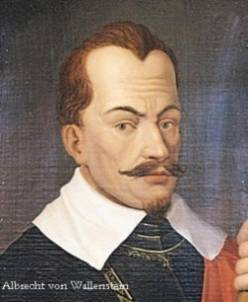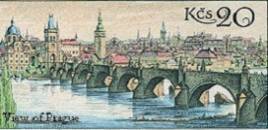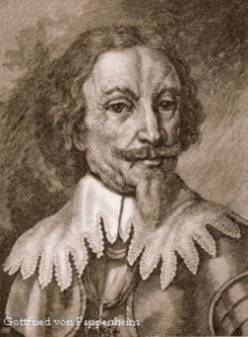
Chapter 1. The Map
"This is absurd," said Morris Roth, as forcefully as he could. He had a bad feeling that wasn't very forceful at all, given that he was wearing an absurd costume—he thought it was absurd, anyway, although it was just standard seventeenth century courtier's clothing. The entire situation was absurd.
A bit desperately, he repeated the statement. "This is absurd." After a couple of seconds, he remembered to add: "Your Majesty."

Fortunately, Wallenstein seemed to be in one of his whimsical moods, where the same possible slight that might have angered him at another time merely seemed to be a source of amusement. General Pappenheim—damn his black soul to whatever hideous afterlife there might be even if Morris didn't believe in hell in the first place—was grinning outright.
"Ah, Morris. So modest!" Pappenheim's scarred face was distorted still further as the grin widened. "How can you claim such a complete absence of heroic qualities? You! The Don at the Bridge!"
Morris glared at him. "It was just a job that needed doing, that's all. So I did it. But what sort of lunat—ah . . ."
Calling the King of Bohemia a "lunatic" to his face was probably not wise. Morris was nimble-witted enough even under the circumstances to veer in midstream. So to speak.
"—what sort of misguided and misadvised person would confuse me with a blasted general? Your Majesty, General Pappenheim, I am a jeweler."
"What sort of person?" asked Wallenstein, chuckling softly. "A lunatic, perhaps. The same sort of lunatic who recently proclaimed himself King of Bohemia despite—yes, I will say it myself—a claim to the throne that is so threadbare it would shame a pauper. But who cares? Since I am also the same lunatic who won the second Battle of the White Mountain."
They were in the small salon in the palace that Wallenstein favored for intimate meetings. He planted his hands on the armrest of his rather modest chair and levered himself erect.
"Levered" was the correct term, too. Wallenstein's health, always delicate, had been getting worse of late. Morris knew from private remarks by Wallenstein's up-time nurse Edith Wild that she was increasingly worried about it. Some of the new king of Bohemia's frailty was due to the rigors of his military life. But some of it wasn't. Wallenstein, unfortunately, was superstitious and still placed great faith in the advice of his new astrologers—including their advice on his diet. Morris had once heard Edith mutter that she was this close—a thumb and fingertip indicated perhaps an eighth of an inch—to getting her revolver and gunning down the astrologers.
It was not an inconceivable thought, actually. Edith was quite ferocious, in her own way, as she'd proved when she'd shot dead the assassination team sent to murder Wallenstein a few months earlier. The reason Wallenstein had "new" astrologers was because they'd replaced some of the old ones who'd been implicated in the plot.
"A jeweler," Morris repeated. Even to his ears, the words sounded like a whine.
Pappenheim waved his hand airily. "And what of it? Every great general began his life as something else. Even a baker, perhaps."
Morris glared at him again. "'Began his life.' I am in my fifties, for the love of God."
"Don Morris, enough," said Wallenstein firmly. "Your reluctance to assume the post of general in my army simply reinforces my conviction that I have made the right decision."
"Why, Your Majesty?" demanded Morris, just as firmly. One of Wallenstein's saving graces was that the man didn't object to subordinates challenging him, up to a point, provided they were polite about it. "My military experience is limited to that of an enlisted soldier in the American army of another universe. What we called a 'grunt'—with exactly the connotations you'd expect from the term. To make things worse, I wasn't even in a combat unit. I was essentially a quartermaster's clerk, that's all, keeping military supply records."
Smiling, Wallenstein looked at Pappenheim. For his part, Bohemia's top general still had the same wolf-like grin on his face.

"Limited to that? Oh, surely not, Don Morris," said Pappenheim cheerily. "You forget the Battle of the Bridge. Which you led—not even you will deny that much—and which has since entered the legends of the Jews all across eastern Europe."
Morris grit his teeth. "I said. It was just a job that needed to be done, and—"
"Enough, Morris," repeated Wallenstein.
Morris fell silent. The fact that the King of Bohemia had dropped the honorific "Don"—which was an informal term, but significant nonetheless—made clear that he considered the argument at an end. Whether Morris liked it or not, his new post as a general in the Bohemian army was a done deal.
"Follow me," said Wallenstein, heading toward one of the doors in the small chamber. Even though Wallenstein was only fifty years old, he moved like a man twenty years older. It was rather painful to watch.
After following Wallenstein and Pappenheim through the door, Morris found himself in a chamber in the palace he'd never seen before. The chamber, also a small one, was completely dominated by a large table in the center of the room. The table itself was dominated by huge maps that covered almost its entire surface.
Once Morris was close enough to see the map on the very top of the pile, he had to restrain himself from hissing.
So. Here it was. He'd heard rumors of the thing, but never seen it.
The map had no legend, but the title of it was plain enough even if invisible. The Future Empire of Wallenstein the Great, would do quite nicely.
Wallenstein and Pappenheim said nothing, for a while, giving Morris the time to study the map.
His first impression never changed. The map could also have been titled How Little Bohemia Became an Anaconda.
Indeed, the "Bohemia" that the top map projected into the future did look like a constrictor, albeit a fat one. On the west, serving for the serpent's head, lay Bohemia, Moravia and Silesia. Then, came a neck to the east, in the form a new province that Wallenstein had labeled "Slovakia." Presumably, he'd picked the name from one of the future history books he'd acquired. Which was all fine and dandy, except that in the here and now there was no country called "Slovakia." What there was in its place was the region of the Austrian empire known as the northern part of "Royal Hungary," the rump of Hungary that had been left to it by the Ottoman Turks after their victory over the Kingdom of Hungary at the Battle of Mohács in 1526.
So. War with Austria. Check.
Of course, that was pretty much a given, with Wallenstein not only a rebel from Austria but allied to the USE. Hostilities between the USE and Austria had died down lately, since Gustav Adolf was preoccupied with his war against the League of Ostend. But nobody much doubted that they would flare up again, unless he lost the war against the alliance of France, Spain, England and Denmark. Assuming he won, everyone with any political knowledge and sense at all knew that Gustav Adolf would turn his attention to Saxony and Brandenburg, and the Austrians were sure to weigh in on the opposite side.
Still, rebelling against Austria and establishing an independent Bohemia was one thing. Continuing on to seize territory from the Austrians that had never been under Bohemian authority was something else again.
It got worse. Or better, Morris supposed, depending on how you looked at it. He had to remind himself that, after all, this was the ultimate reason he'd come to Prague and decided to throw in with Wallenstein. The worst massacre that would ever fall upon Europe's Jewish population prior to the Holocaust was "due to happen" in fifteen years, in the Chmielnicki Pogrom of 1648, unless something was done to upset the applecart.
Morris had finally decided that the best chance for upsetting that applecart—a very intractable applecart, given the complex social and economic factors involved—was to ally with Wallenstein and rely on him to be the battering ram.
He still thought that was the best alternative. What he hadn't figured on was that Wallenstein would return him the favor and propose to make Morris the battering ram.
But he'd leave that aside, for the moment. He went back to studying the map.
East of "Slovakia," the proposed new Greater Bohemia starting getting a lot fatter, like an anaconda that had just swallowed a pig. The big new belly of the new empire would consist of most of the region that was today usually called Lesser Poland, a huge territory which comprised the southern half of the Polish-Lithuanian Commonwealth. In the future history Morris came from, most of that would eventually become part of Ukrainia.
War with Poland. Check.
Well . . . Being honest, Morris knew that was pretty much a given also, if he was to have any hope of forestalling the Chmielnicki Pogrom. The noble magnates who dominated the political life of the Poland-Lithuanian Commonwealth were bound to be hostile to any project which removed the corrosive social tensions in Lesser Poland. Much of their wealth and power came from those tensions.
From there, the map got rather vague. The northern boundary of Wallenstein's proposed empire followed the Dnieper river from its headwaters near Lublin, taking in Pinsk as well as Kiev. The southern boundary was less distinct, being indicated by a shaded area rather than clear borders, although it generally seemed to follow the line of the Carpathians and the Dnestr river. Morris suspected that Wallenstein wanted, if possible, to avoid any outright clashes with the Ottoman Empire. He'd take what he could, but stop short of challenging the Turks directly.
Marked in faint pencil lines further east was what amounted to a long tail that stretched into the southern regions of what Morris thought of as "Russia," although in the seventeenth century the area—this was true of much of Lesser Poland, as well—was very much a borderland thinly inhabited by a wide mix of peoples.
So. War with Russia and the Cossacks. Check. Tatars too, mostly likely.
Morris let out a slow breath. Maybe war with the Muscovites and Tatars could be avoided. As for the Cossacks . . .
Mentally, he shrugged his shoulders. Morris had as much sympathy for the Cossacks as any late twentieth century Jew with a good knowledge of history.
Zilch.
Fuck 'em and the horses they rode in on. The same bastards who led the Chmielnicki pogrom—and then served the Tsars as their iron fist in the pogroms at Kiev and Kishinev.
Wallenstein and Pappenheim still weren't saying anything. Morris leaned back a little and started scrutinizing the map again, west to east.
The plan was . . . shrewd. Very shrewd, the more he studied the map.
Morris didn't know exactly where the ethnic and religious lines lay in the here and now. Not everywhere, for sure and certain. But he knew enough to realize that what Wallenstein proposed to do was to gut the soft underbellies of every one of Bohemia's neighbors.
Silesia, in this era, was not yet really part of Poland, as it would become in later centuries in the universe Morris had come from. Its population was an ethnic mix, drawn from many sources—most whom were Protestants, not Catholics. And Wallenstein already started as the Prince of Sagan, one of Silesia's provinces.
Despite the name, "Royal Hungary" in the seventeenth century was mostly a Slavic area, especially in the north, ruled by the Magyars but with no real attachment to Hungary. Morris wouldn't be at all surprised if most of its inhabitants would view a Bohemian conquest as something in the way of a liberation. They certainly weren't likely to rally to the side of their Austrian and Hungarian overlords.
Moving still further east, the same was true again. "Lesser Poland" had little in the way of a Polish population—and that consisted mostly of Polish noblemen grinding under their Ruthenian serfs. As for the Ruthenians themselves, the name was not even one that they'd originated, but a Latin label that had been slapped onto them by western European scholars. In a future time, most of them would eventually become Ukrainians. But, in this day and age, they were a mix of mostly Slavic immigrants—with a large minority of Jews living here and there among them.
Most of the Jews lived in the larger towns and were engaged in a wide range of mercantile and even manufacturing activities. The Polish-Lithuanian Commonwealth did not maintain in practice the same tight restrictions on Jewish activity that most realms in Europe did. Unfortunately, a number of them had also moved out into rural areas.
"Unfortunately," from Morris' viewpoint, because these Jews did not spread into the countryside as farmers. Instead, they spread as rent-collectors and overseers of the large landed estates maintained by mostly-absentee Polish magnates. They were universally hated by the Ruthenian peasantry—who, in the nature of things, did not make any fine distinctions between the small class of Jews who oppressed them and the great majority of the Jewish populations in the towns who were simply going about their business.
Wallenstein's shrewdness was evident wherever Morris looked on the map. He proposed to seize Lvov, for instance, but did not propose to take Krakow. Looked at from one angle, that was a little silly. At the end of the year 1633, the population of Krakow was also mostly non-Polish. Wallenstein could even advance a threadbare claim to the city, since it had once been under the authority of the Kingdom of Bohemia.
But the Poles had an emotional attachment to Krakow, since it had once served as their capital city and Krakow Academy was still Poland's most prestigious university. So, Wallenstein would seize everything south of the Vistula, including the little town of Podgórze opposite Krakow—but did not propose to cross the river and seize Krakow itself. Thereby, he'd avoid as best he could stirring up Polish nationalism, while establishing a defensible border.
Sum it all up and what you had was what amounted to Wallenstein's preemptive strike at every existing realm in eastern Europe. He would seize all the territories that each of them claimed—but for which none of them had really established any mutual allegiance. The end result, if his plans worked, would be a Bohemian Empire that rivaled in territory and population any of the nations in Europe.
Morris scanned the map again, west to east. With Prague as the capital—it was already one of the great

cities of Europe—and a mostly-rural territory stitched together by a number of major cities. Bratislava, Lvov, Lublin, Kiev—and Pinsk, way to the north, in what would someday become Belarus.
Morris couldn't help but chuckle. Pinsk, which already had a large Jewish population and would, by the end of the nineteenth century, have a population that was ninety percent Jewish.
There weren't many Jews in Bratislava. But Lvov, Lublin and Kiev were heavily Jewish.
"You propose to use us as your cannon fodder," he muttered.
Wallenstein didn't quite sneer. "Yes, of course. It's either that or serve the Cossacks as mincemeat fifteen years from now. Make your choice."
Idly, Morris wondered where he'd gotten the term "mincemeat," which Wallenstein had said in English. Probably from Edith Wild.
Make your choice.
Put that way, it was easy enough.
"I'll need the Brethren," Morris said.
"Yes, you will. Not a problem." Wallenstein's long finger came to rest on Lublin. "There is a very large concentration of the Brethren here, you know. And others, scattered throughout the region."
Morris hadn't know the Brethren had a presence in Lublin, as it happened. The news caused him to relax a little. If the Brethren could also serve as what amounted to Wallenstein's social garrisons in the major cities of his proposed empire, that would remove some of the tension on the Jews. They were themselves Christians, after all.
Well. Of a sort. The Brethren were usually referred to as "Socinians" by other Christians, and were generally considered the biggest heretics around.
Still, it might work—assuming Morris had any chance of translating his pitiful military experience into anything worth a damn on the battlefield.
To his surprise, it was Pappenheim who crystallized the thought that Morris was groping toward.

"Stop thinking of a 'general' in narrow terms," said the man who was perhaps the current world's best exemplar of a general in narrow terms. Pappenheim was a man of the battlefield, with little interest in anything else. "Think of it in broad terms. You simply have to organize the military effort, while you concentrate on the political and social matters. Let others, better suited for the task, lead the troops on the field."
He grinned again in that savage way he had. Then, jabbed a thumb at Wallenstein. "That's what he does, mostly, you know."
Morris stared at Wallenstein. The recently crowned King of Bohemia and proposed usurper of much of eastern Europe stared right back at him.
It was true, actually. Wallenstein hadn't been so much a "general" as what you might call a military contractor. He put together armies—and then found men like Pappenheim to lead them into battle.
Put that way . . .
It didn't sound quite so bad. Of course, Morris would still have to find his equivalent of Pappenheim, since he had no doubt that Pappenheim himself would be fully occupied in the next few years fighting Bohemia's immediate enemies. That'd be the Austrians, mostly. Probably the Poles, too.
"Yeah, sure." Morris looked back at the map, trying to estimate the territory Wallenstein expected him to seize and hold over the next few years. At a rough guess, somewhere around two hundred thousand square miles. About the size of Mexico, he thought. Just what a former army supply clerk-cum-jeweler had always expected he'd wind up doing.
"Piece of cake," he said.
To be continued in Volume 13